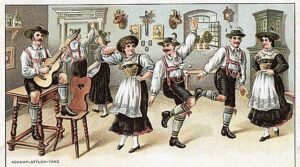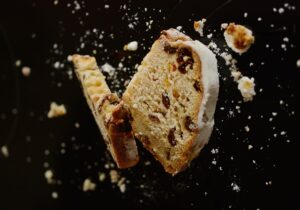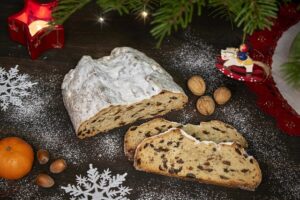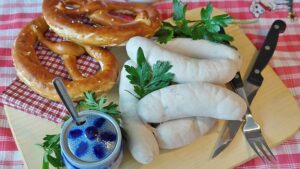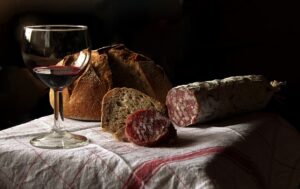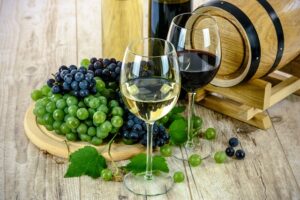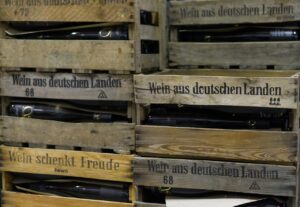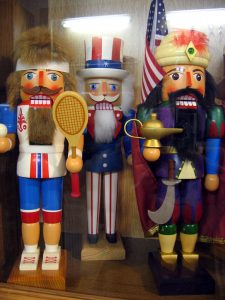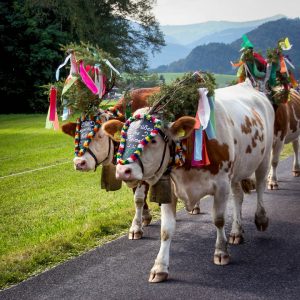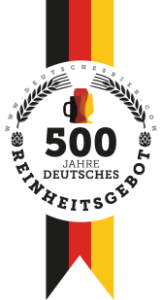Schuhplattler is a traditional folk dance native to the Alpine regions of Bavaria in Germany and Tyrol in Austria. Renowned for its athletic leaps, impressive spins, and rhythmic clapping, Schuhplattler is a dance that carries the heritage, folklore, and history of its homeland in every step and stomp. Historical Background of … [Read more...]
A Taste of Tradition: The Rich History of Stollen Bread
As we explore the unique culinary traditions across the world, Germany's rich food culture serves up a sweet surprise - the Stollen bread. This distinctive and festive bread, dusted with powdered sugar to resemble the snow-covered landscape of winter, takes center stage during the holiday season. It's a beloved food tradition that embodies … [Read more...]
Traditional German Stollen Bread Recipe
If you're looking to bake something unique and festive this holiday season, a traditional German Stollen Bread might be just the treat you're looking for. Also known as Christmas Stollen or Christstollen, this bread is a delightful blend of nuts, fruits, and spices, all coated in a snowy dusting of powdered sugar, making it look like a miniature … [Read more...]
A Journey Through German Cuisine: A Feast of Tradition and Diversity
Germany, with its rich and diverse food traditions, has long been celebrated for its culinary prowess. Its regional specialities vary widely, reflecting the cultural influences, agricultural resources, and historical events that have shaped the nation. From hearty meat dishes and robust sausages to tangy sourdough bread and decadent cakes, German … [Read more...]
The Rise of Monastic Winemaking in Germany: German Medieval Wine Culture
Germany, renowned for its rich winemaking traditions, has a fascinating history deeply intertwined with the monastic communities that flourished during the Middle Ages. This period witnessed the rise of monastic winemaking, contributing to the development of German medieval wine culture. In this article, we delve into the captivating story of how … [Read more...]
Roots of German Winemaking
German winemaking boasts a storied heritage that spans centuries, cultivating a reputation for exceptional wines renowned worldwide. The roots of this revered winemaking tradition run deep, weaving together a tapestry of history, terroir, and craftsmanship. In this article, we delve into the origins and evolution of German winemaking, shedding … [Read more...]
A Sip Through Time: Unveiling the Fascinating History of German Wine
The story of German wine is a captivating journey through centuries of tradition, craftsmanship, and innovation. From the rolling vineyards along the Rhine and Mosel rivers to the quaint winemaking villages nestled in the valleys, Germany has been an integral part of the wine world for over a millennium. In this article, we explore the rich history … [Read more...]
Wooden Toys from the Ore Mountains
Ore Mountain folk art (Erzgebirgische Volkskunst) is a well-known form of highly artistic wood carving from East Germany. Typical creations include Christmas decorations and products such as wooden miners' figures (Bergmannsfigur), Christmas angels (Weihnachtsengel), Reifendrehen figures of animals made by wood turning, smoking figures … [Read more...]
Almabtrieb and Viehscheid – Bringing Cattle Home from Mountain Pastures
Bavaria may be the home of BMW and Audi, but there are still some age-old rural traditions that surprise even visitors from other parts of Germany. One of which is the annual festival which celebrates the return of the prodigal cows, the Viehscheid. Because here the cows really do come home, every autumn, after having spent their summers up in the … [Read more...]
Reinheitsgebot
The Reinheitsgebot, literally "purity order", sometimes called the "German Beer Purity Law" in English, is a series of regulations limiting the ingredients in beer in Germany and the states of the former Holy Roman Empire. The best-known version of the law was adopted in Bavaria in 1516, but similar regulations predate the Bavarian order, and … [Read more...]
- « Previous Page
- 1
- …
- 8
- 9
- 10
- 11
- 12
- …
- 17
- Next Page »
